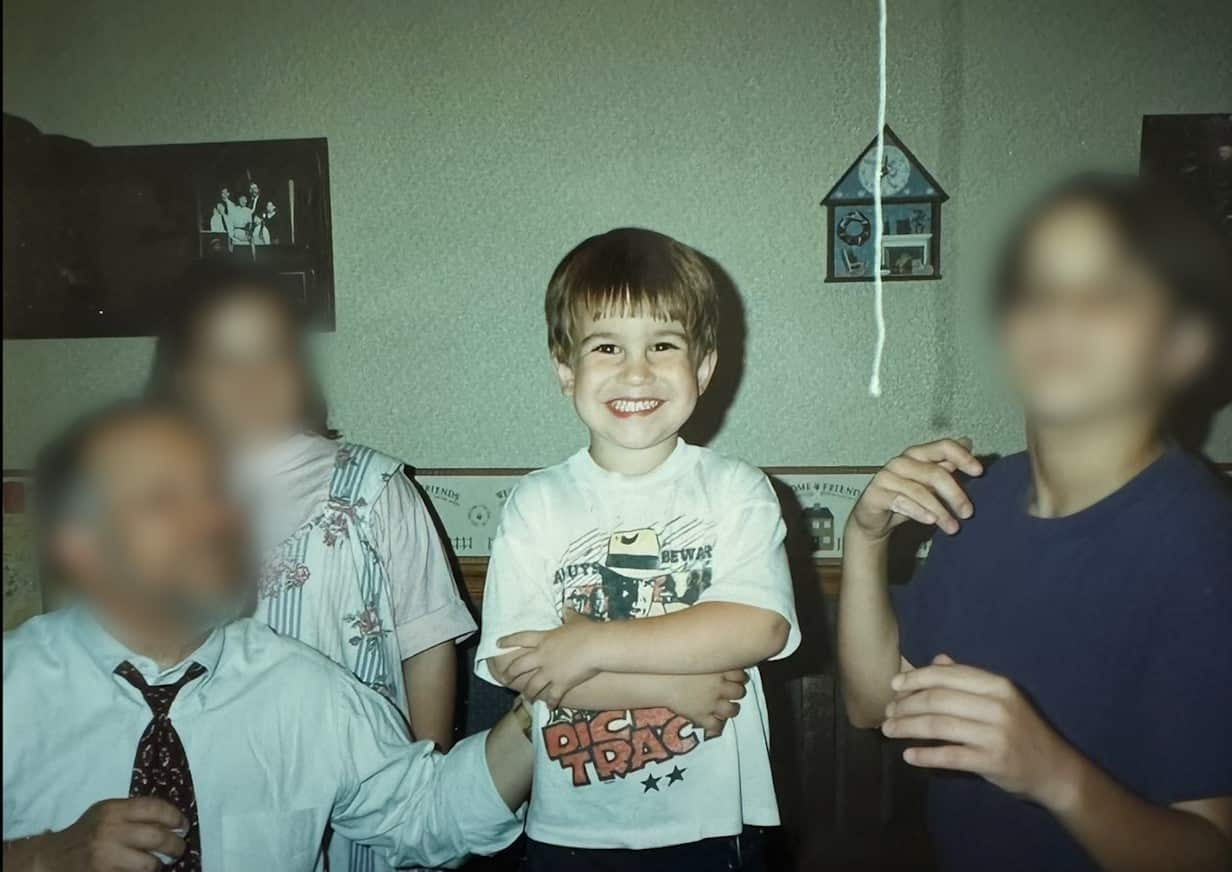Medium Build, otherwise known as Nick Carpenter, has spent a lot of time reckoning with his past.
Born in Georgia in the southern US to two former Christian missionaries, the singer-songwriter grew up deeply devoted to his family's church — before rapidly shedding his whole belief system around the age of 18.
"It was like there were all these little tiny cracks that were so deep down."
"And then within a year — like 18 to 19 — it was just like the whole thing was gone."
Now in his 30s, Medium Build has started to accumulate a loyal international fanbase for Carpenter's disarmingly honest, diary-like lyrics — many of which meditate on the confusion of growing up in a devout household while also questioning its foundations.
Whilst describing himself as a "subservient" child within his church’s ecosystem, Carpenter says he started to interrogate his family's religion when he entered high school and made friends with people from different religious backgrounds.
After being told those families would not enter heaven by members of his church, Carpenter says he started to become frustrated with the dogma.
"I just couldn’t understand a loving God character that didn’t want to let people into the party," he says.
"That was kind of the unravelling."
When he left the church entirely in his late teenage years, Carpenter says he began to synthesise his emotional experience into songwriting for the first time.
"There was a guy that I wanted to be and the guy that I was — and they weren’t connected."
"And I’d say that year is when I started giving the voice to him."
Carpenter admits that his songwriting since that time — at least in part — has been an act of processing the tension he experienced as a child questioning his parents' beliefs.

"I think for the past, it’s been very helpful to give that kid a voice — usually the 10-year-old that felt stuck in that really weird, sticky, Christian, zipped-up place," he says.
"I think the more I could give him songs, writing about his experience, it was helpful for me to heal."
Carpenter says his relationship with his parents was also strained during this time and they felt profound grief in the aftermath of his decision to leave.
While he initially felt resentful of this, he says he’s since learned to feel empathy for them because of their prevailing love for him and belief they will no longer "spend forever together".
In a recent release titled John and Lydia, Carpenter inspects his parents' personal narratives to a driving beat patently reminiscent of Bruce Springsteen.
"I know the people you learned from told you it was all black and white," he sings.
"The things that were shaping you, the things that are shaping me. And we both know you can’t run from family."
'Screaming my guts out'
However, Carpenter's songwriting also strays beyond family and the past. Currently based between Alaska and Tennessee, he turns a naturally introspective lens to relationships, his queer identity, and steering his newfound success.
In Drug Dealer, which begins with the lyrics: "I think I got a crush on my drug dealer, he’s so cute when he gets high", Carpenter says he was trying to play with the concept of suddenly becoming the object of audiences' fascination and understanding the loneliness of being the subject of desire.
"Now I’m a bit more curious about who I can be or who I want to be," he says of his songwriting journey.
Genre-fluid
Carpenter's music is markedly genre-agnostic, swinging between indie rock, pop, folk and alternative country.
His recognition has grown alongside the explosion of other singer-songwriters like Zach Bryan and Noah Kahan — artists that young audiences have been turning to for their acoustic storytelling.
While Carpenter believes this new generation of country and folk singers is being driven in part by a natural cycle after years of "pop maximalism" but he also sees something inherently appealing for audiences in the genre.
"I think when people want to say something kind of gooey and from the core, I think a little bit of a fiddle and an acoustic guitar and a little bit of 'stomp-clap', that’s just a proven bed for 'This is my authentic self'."
Regardless of the genre he’s playing in, Carpenter says he can still often hear the heady influence of his upbringing in his own music.
He says the tendency of his songs to rise slowly into a fervour is very typical of the songs he was raised to.
"I sponged that sort of ethereal, mournful, spiritual, magical, fog-machine vibe from my mum, from all the church," he says.
"I think there some drama in my music the way that all my songs kind of start gentle and build to this big thing and I’m screaming my guts out."
As for how he is navigating the increasing success this songwriting is earning, Carpenter says the novelty of touring worldwide has started to wear off recently and sacrificing his lifestyle at home has become taxing.
"What I was doing to try to combat that was go harder, do more, party harder, go to every restaurant, have every wine, experience more," he says.
However, this behaviour culminated in a panic attack he experienced on a European stage in November.
"I was drunk and I was in a wig and I was chasing 15 out of 10 — that's what I wanted. I wanted just to stay up," he says.
He says he has since instituted personal and professional boundaries to stave off burnout as a performer but his preference for people-pleasing was deeply ingrained in the church — and may be tricky to unlearn.
"I think there’s still that little Christian kid that wants to save everybody, say yes to everyone."
Through award winning storytelling, The Feed continues to break new ground with its compelling mix of current affairs, comedy, profiles and investigations. See Different. Know Better. Laugh Harder. Read more about The Feed
Have a story or comment? Contact Us


